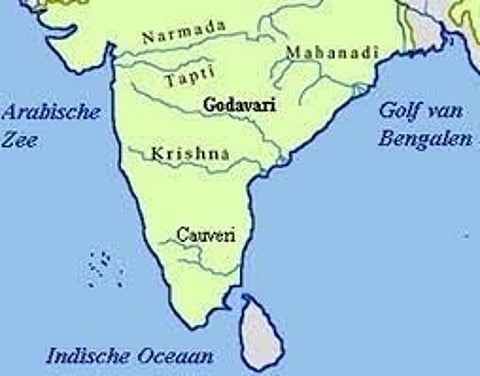

From the beginning, the linking of the Godavari and Cauvery Rivers has faced many obstacles, with partner states bringing fresh proposals in every meeting. Once again, recently held Task Force Committee meeting brought to light the fact that nothing is moving forward.
Chhattisgarh's Stand
According to Task Force Committee Chairman Atul Jain, the project would not merely divert those 148 TMC (thousand million cubic feet) of water which Chhattisgarh is not using, nor would it touch the water allocations in the Godavari Water Disputes Tribunal. However, Chhattisgarh opposed this saying about their ongoing Bodhghat project of 100 TMC capacities and the shortage of water from November till June, suggesting that surplus water in excess of their share can be taken away from the Indravati sub-basin only. Chhattisgarh also fears submergence in their state by construction of the Ichampally project. There is opposition from the State, albeit the chairman assuring that it would not affect their allocated share;
Telangana's Proposals
Telangana demanded a 50% share of the water of the Godavari-Cauvery link project, which was initially taken to be 43.6%. The Task Force rejected this and clarified that the water being diverted isn't solely from the Godavari, and that giving 50% to one state would derail the entire process. The committee noted that all four major states would get over 20% of the water. Telangana made the following proposals:
Chhattisgarh must agree to divert its unutilized 148 TMC of water.
If the Ichampally project is built, Telangana should be allowed to use 200 TMC of floodwaters.
Pending projects in Telangana based on Godavari's dependable flows (like Devadula, Sammakkasagar, Sitammasagar, and Sitarama lift projects) requiring 152 TMC of water should be approved.
States should have the freedom to decide which command areas to irrigate with the diverted water.
An operation protocol schedule must be finalized.
A MoU (Memorandum of Understanding) should only be moved forward after resolving all states' concerns and reaching a consensus.
Andhra and Karnataka's Concerns
Andhra Pradesh introduced four new link proposals, but the Task Force clarified these were not part of the Godavari-Cauvery project and were only for informational purposes. Telangana insisted that these new proposals should not be discussed.
The Centre also decided to include the Bedti-Varada project with the Godavari-Cauvery link. Karnataka requested an increase in its water share from 34.4 TMC (18.5 TMC from Bedti-Varada and its share from the Godavari link) to 40-45 TMC, which the Task Force rejected. The Task Force also proposed two alternatives for the Bedti-Varada project:
Divert 18.5 TMC of water to the Tungabhadra reservoir. Karnataka rejected this, citing siltation issues in the reservoir.
A direct water diversion is the key proposal. Karnataka agreed to this but only if its water allocation was equal to other states, which the chairman refused.
Maharashtra also requested to be a partner in the project, but the chairman did not agree since the diverted water wasn't solely from the Godavari.
Tamil Nadu's Position
Tamil Nadu is the only state to have shown a positive attitude towards the Godavari-Cauvery link. Since any amount of water it receives would be a bonus, the state has been advocating for the project from the very beginning.
